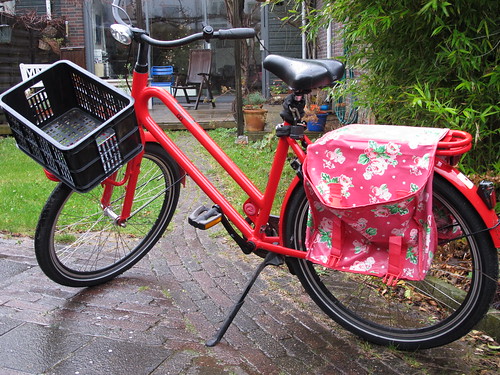 First let's talk about my bicycle (that's how my first blogpost started though you can see how my bicycle changed!). In november my accelerators broke down. First I felt like I was peddling like crazy.. But it took me a long time to make an appointment for repairs (for several reasons: bicycle repair shop had disappeared etc.). So after one month it seemed like completely normal to pedal in first gear only, I had completely gotten used to it.
First let's talk about my bicycle (that's how my first blogpost started though you can see how my bicycle changed!). In november my accelerators broke down. First I felt like I was peddling like crazy.. But it took me a long time to make an appointment for repairs (for several reasons: bicycle repair shop had disappeared etc.). So after one month it seemed like completely normal to pedal in first gear only, I had completely gotten used to it.Now let's make the link to organisations and professionals. Many people don't have time to explore the usefulness of social media for their work because they are already overwhelmed with email. Email has become something terrible yielding negative energy ("I still have to do my email"). They associate social media as being worse than email, even more messages, even faster flow of information. You will be even more behind!
I used to feel that you don't have to embrace social media, but I changed my thinking. Now I am convinced that as a professional you have to digest a lot of information: be able to scan, prioritise, make sense and contribute. It is part of being a creative, learning, improving, exploring professional. So they have to learn how to digest and filter information. A person I and other have frequently cited is Clay Shirky ("I study the effects of the internet on society") who said "it's not informatie overload but filter failure". In a presentation I once asked whether people also complain about too many books in the library, which made people laugh. In the library you know how to search and filter, using your favourite authors, search engine etc.
Professionals can use a 3 - step strategy to filter:
- Know your knowledge domains. I read a book about personal branding where they used the term icloud - a tag cloud with words of interest to you, your interest areas. This seems more logical for freelance consultant, but not for all professionals in organisations. I think you should define 3- 5 core knowledge domains (eg I have a focus on social learning, social media, communities of practice). Within organisations this is something to be discussed. Not only your tasks but also your knowledge fields should be clear. (why not include those in job descriptions?)
- Choose your networks- focus on the communities and networks that matter to you. I'm sure if you know your domain and find relevant networks you will not stop following them. Don't follow too many networks that are nice to know of. Focus and engage in a few. If you have the capacity to filter many more- fine.
- Use handy tools that help you scan rapidly and filter. Think of Twitter lists, Hootsuite or Tweetdeck to sort out information flows and set up a dashboard. RSS readers like Google reader are good to follow many feeds. I'm sure there are lots of other tools, but it helps to exchange with colleagues and take the time to test things and try something new every once in a while.
Do you agree that professional have to filter? Or are there professions that you can perfectly perform without this new compentence? Might be! So let me know in a reaction


